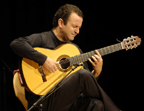Welcome to one of the most active flamenco sites on the Internet. Guests can read most posts but if you want to participate click here to register.
This site is dedicated to the memory of Paco de Lucía, Ron Mitchell, Guy Williams, Linda Elvira, Philip John Lee, Craig Eros, Ben Woods, David Serva and Tom Blackshear who went ahead of us.
We receive 12,200 visitors a month from 200 countries and 1.7 million page impressions a year. To advertise on this site please contact us.
|

|
|
Open G or an A?
|
You are logged in as Guest
|
|
Users viewing this topic: none
|
|
Login  | |
|

   
mark indigo
Posts: 3625
Joined: Dec. 5 2007

|
 RE: Open G or an A? (in reply to Auda) RE: Open G or an A? (in reply to Auda)
|
|
|
What does it sound like to you, open 3rd string or 2nd fret 3rd string?
Which do you like best, open third string or second fret third string?
Play that.
Seriously.
Play what you hear and/or what you like. It's your interpretation.
You are much better off closing the book, slowing down the audio to half speed and learning it from that. Use software or a media player that allows you to loop small sections.
If you can't get it from half speed audio you probably won't be able to play it anyway. I am not kidding, that's my experience.... and I wasted years of my life with transcriptions before I put them all back on the shelf and devoted myself to just trusting my ears and developing that skill.
It sounds like an A note to me, ie. an A chord not an A7 chord. But both would be perfectly appropriate in that context.
re the Bb chord, the one on the first beat of the line of music before the two golpes and the disputed A/A7 chord, it's an upstroke on beat 6 I think, so that's typical.
I can't see how the half compas before that is notated but it sounds like beat 3 is a heavy down (I would do that with MA - I don't know what Trotter thinks Sabicas did), 4 is empty, 5 is a light downstroke with index, and 6 is upstroke.
Maybe Paul can tell us if he knew Trotter, and/or if Trotter was working from lessons with Sabicas or Escudero, or from going to see Sabicas live and booking as seat in the front row, or ancient VHS tape... because otherwise his transcription, like any other transcription, is ultimately his interpretation of what he is hearing on the same audio we are listening to. More or less informed by his knowledge and experience, of course, but ultimately an interpretation.
_____________________________
|
|
|
|
REPORT THIS POST AS INAPPROPRIATE |
Date Nov. 15 2019 17:20:38
 |
|
 New Messages New Messages |
 No New Messages No New Messages |
 Hot Topic w/ New Messages Hot Topic w/ New Messages |
 Hot Topic w/o New Messages Hot Topic w/o New Messages |
 Locked w/ New Messages Locked w/ New Messages |
 Locked w/o New Messages Locked w/o New Messages |
|
 Post New Thread
Post New Thread
 Reply to Message
Reply to Message
 Post New Poll
Post New Poll
 Submit Vote
Submit Vote
 Delete My Own Post
Delete My Own Post
 Delete My Own Thread
Delete My Own Thread
 Rate Posts
Rate Posts
|
|
|
Forum Software powered by ASP Playground Advanced Edition 2.0.5
Copyright © 2000 - 2003 ASPPlayground.NET |
0.078125 secs.
|


 Printable Version
Printable Version







 New Messages
New Messages No New Messages
No New Messages Hot Topic w/ New Messages
Hot Topic w/ New Messages Hot Topic w/o New Messages
Hot Topic w/o New Messages Locked w/ New Messages
Locked w/ New Messages Locked w/o New Messages
Locked w/o New Messages Post New Thread
Post New Thread